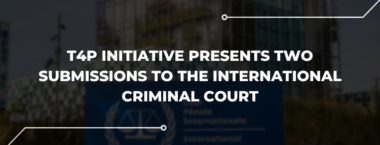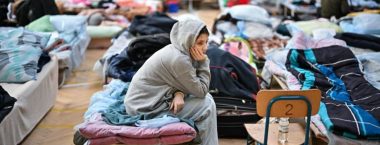
Torments, Torture Chambers, Executions: T4P Initiative Presents Two Submissions to the International Criminal Court
Information about extrajudicial executions of Ukrainians by the Russian military and Russian torture chambers in...
28 September 2023
10.05.2019
During the past two months, the Ukrainian Helsinki Human Rights Union, within the framework of the USAID Human Rights in Action Program, organized a series of awareness-raising events concerning the rights of civilians whose health was damaged because of the armed conflict. In particular, the discussions were held in Mariupol, Pokrovsk, Toretsk, Slovyansk, Kramatorsk and Sumy.
The main goal of these events was to inform stakeholders about the rights and services guaranteed to people whose health was damaged as a result of the armed conflict, by presenting the analytical report “Rehabilitation of victims of the conflict. Does the state offer anything other than disability status and crutches?” UHHRU experts Bogdan Moysa and Yuliya Naumenko told the participants how to obtain the status of a person with disability sustained as a result of the armed conflict as well as appropriate rehabilitation services.
In the cities, the UHHRU experts also identified priority tasks and actions that must be taken to improve the situation at the local level, for victims of the armed conflict as well as for the rest of the population. However, general analysis of available information reveals a number of systemic problems common to all regions.
“We are talking about the long and complex procedure for establishing disability and the lack of free diagnostic services. It should also be noted that rehabilitation and support services provided at the local level to people affected by the armed conflict in eastern Ukraine are insufficient for meeting the existing needs,” says Bogdan Moysa.
Slovyansk is a perfect example of this. The fighting broke out there in April-July 2014 and resulted in a large number of casualties, including among civilians. Despite this, many people there are still unable to prove that they had got disability because of this. Some of the victims also find it difficult to obtain documents confirming the opening of criminal proceedings regarding their injuries. Even establishing the disability status is problematic. The drawn-out in-patient monitoring for periodic reviews of disability group as well as frequent failure to take into account all aspects of health deterioration force many people to give up on getting their disability status.
In Toretsk, the participants also brought up the burdensome financial component of the procedure. The high cost of MRI examination essentially makes it impossible to establish disability. That’s where another risk arises – the risk of losing one’s job.
“There are no job opportunities in the city. If I get the disability status, I’m just going to get fired,” says one of the victims.
Centers for Aid to ATO Participants have been established within local state administrations in each rayon center. They are supposed to keep those who took part in the military operations informed about the services they can get during rehabilitation as well as other opportunities for getting help, but, according to the participants of the awareness-raising events, local authorities do not put enough effort into informing the public about the existence of these centers.
“Perhaps, these aid centers do exist as you claim, but no one knows about them,” says a representative of an association of veterans who sustained injuries in course of the military operations in Pokrovsk.
In Mariupol, when discussing categories of victims, the participants focused on children with disabilities.
“The children’s health suffered after hiding from shelling and being forced to relocate to safe territory. As a result, the level of rehabilitation previously enjoyed by them was lost, and our city is unable to provide the proper quality of services,” says the leader of a local organization defending children with disabilities.
There is yet another system-wide problem shared by all regions – weak support of non-governmental rehabilitation institutions by local authorities.
“Local governments should be more committed to supporting psychological assistance initiatives for the victims,” says a representative of one of Pokrovsk rehabilitation institutions.
In light of all these problems with victim rehabilitation, UHHRU will continue its advocacy efforts aimed at improving the situation with obtaining disability status and accompanying services, including but not limited to rehabilitation.
This work was made possible by the generous support of the American people through the United States Agency for International Development (USAID) in the framework of the Human Rights in Action Program implemented by the Ukrainian Helsinki Human Rights Union (https://old.helsinki.org.ua/).
Opinions, conclusions and recommendations presented in the report or elsewhere do not necessarily reflect the views of the USAID or the United States Government. The contents are the responsibility of the authors and UHHRU.
USAID is the world’s premier international development agency and a catalytic actor driving development results. USAID’s work demonstrates American generosity, and promotes a path to recipient self-reliance and resilience, and advances U.S. national security and economic prosperity. USAID has partnered with Ukraine since 1992, providing more than $3 billion in assistance. USAID’s current strategic priorities include strengthening democracy and good governance, promoting economic development and energy security, improving health care systems, and mitigating the effects of the conflict in the east. For additional information about USAID in Ukraine, please call USAID’s Development Outreach and Communications Office at: +38 (044) 521-5753. You may also visit our website: http://www.usaid.gov/ukraine or our Facebook page at https://www.facebook.com/USAIDUkraine.
If you find an error on our site, please select the incorrect text and press ctrl-enter.

Information about extrajudicial executions of Ukrainians by the Russian military and Russian torture chambers in...
28 September 2023

Since the beginning of the full-scale Russian invasion of Ukraine, about 150,000 civilians who fled...
17 October 2022
Taras Shevchenko National University of Kyiv and its student community in cooperation with leading Ukrainian...
13 September 2022

Ukraine’s latest request to the European Court of Human Rights (ECtHR) to order Russia to...
07 September 2022